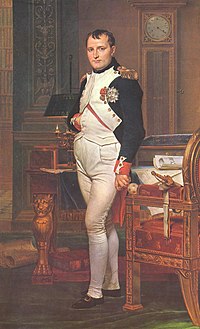Lịch sử châu Âu/Napoleon Bonaparte và sự phát triển của Chủ nghĩa dân tộc
|
|
Trang này được dịch bằng máy từ trang gốc European History/Napoleon Bonaparte and the Rise of Nationalism. Hãy đóng góp cho trang này bằng việc dịch lại một cách chuẩn xác hơn! |
Giới thiệu
[sửa]
Trong một nỗ lực tốt hơn để ngăn chặn những người bảo hoàng được bầu cử tự do nắm quyền kiểm soát Danh mục vào năm 1799, các thành viên của tư sản đã cử Napoléon Bonaparte và quân đội của ông bảo vệ Danh mục và bãi bỏ các cuộc bầu cử. Tuy nhiên, Napoléon đã lợi dụng tình hình này và trong cuộc Đảo chính Brumaire đã nắm quyền kiểm soát quốc gia.
Lãnh sự quán 1799-1804
[sửa]Napoléon nắm quyền kiểm soát và ban đầu cài đặt một chế độ chuyên quyền giác ngộ được gọi là Lãnh sự quán. Trong thời gian này, Napoléon đã thiết lập một số cải cách quan trọng của Khai sáng. Điều quan trọng nhất trong số này là Bộ luật Napoléon của ông, cung cấp quyền tự do tôn giáo, bộ luật thống nhất, bình đẳng xã hội và pháp lý, quyền sở hữu tài sản và chấm dứt các lệ phí phong kiến. Ông cũng thực hiện một nền giáo dục bắt buộc trên toàn tiểu bang, được gọi là Đại học Pháp. Năm 1801, ông chấm dứt việc phi Thiên chúa hóa.
The Empire 1804-1814
[sửa]
Napoleon declared himself French Emperor and became a military dictator. Napoleon was undefeated against his three main continental enemies, defeating Austria, Russia, and Prussia multiple times. During his tenure, he took control of large amounts of mainland Europe. However, Napoleon failed to subdue England, and was defeated in his attempt to crush the English Navy at the Battle of Trafalgar by Admiral Nelson. As a result, Napoleon employed the Continental System, a method of economic warfare. He prohibited trade with the British by blockading all coasts of Europe from English export. Unfortunately for Napoleon, this failed, as the British still were able to smuggle goods into Europe, and were also able to trade with their colonies, Asia, and the United States. Napoleon eliminated the Holy Roman Empire, and in 1806 consolidated it into 40 states and named it the Confederation of the Rhine.
After Alexander I of Russia withdrew from the Continental System, Napoleon invaded Russia in 1812. For the first time, Napoleon failed, as the Russian army employed scorched earth tactics to defeat Napoleon's army. However, Napoleon quickly raised a new army, but this army was crushed by the Quadruple Alliance of England, Austria, Russia, and Prussia at the Battle of Nations/Leipzig in 1813. Napoleon was exiled to the island of Elba, but he managed to escape and return in 1815 in a period known as the Hundred Days. The Quadruple Alliance again crushed his new army at the Battle of Waterloo, led by the great British General Wolsey (Duke of Wellington). Napoleon was then exiled to the island of Saint Helena where he died in 1821. the army Napoleon raised at the battle of waterloo was weak and inexperienced hence his downfall was inevitable
The Congress of Vienna 1814-1815
[sửa]The Quadruple Alliance assembled at the Congress of Vienna to create a post-Napoleonic Europe. Their representatives were Castlereagh of England, who assembled the Quadruple Alliance, Talleyrand of France, Metternich of Austria, and Alexander I of Russia.
The Congress of Vienna was incredibly lenient toward France. It simply restored the old boundaries and restored Louis XVIII to the throne. It imposed no reparations. This was done because the allies desired a stable, prosperous France that would not threaten them with revolution or invasion.
The Restoration of Louis XVIII Bourbon
[sửa]Louis XVIII did not wipe out the gains of the Revolution. Rather, out of fear of revolution, he signed the Charter of 1814 that provided legal equality, offices open to all men, a two chamber parliament, Napoleonic civil code, and the abolition of feudalism.
A Shift in Foreign Policy
[sửa]After Napoleon's fall, European foreign policy took a major shift. While preserving the balance of power was still important, now much more prominently featured in war would be advocates of liberalism (revolutionaries, republicans, nationalists) versus conservatism or the "Old Regime" (the monarchy, aristocrats, clergymen).
Old Regime monarchs, led by Klemens Wenzel von Metternich of Austria, used the Congress System, also known as the Concert of Europe, to prevent revolution and war. At the Congress System the leading of nations of Europe worked together to prevent the outbreak of revolution in each nation.
A New Nationalism
[sửa]Many of the territories occupied by Napoleon during his Empire began to feel a new sense of nationalism. During the occupation, Napoleon destroyed and disallowed many nation's individual cultures, and the people of these nations greatly resented this. As a result, Napoleon's conquests spurred a new nationalism in the occupied nations, particularly in Germany and Italy, at a level that had never previously existed.

